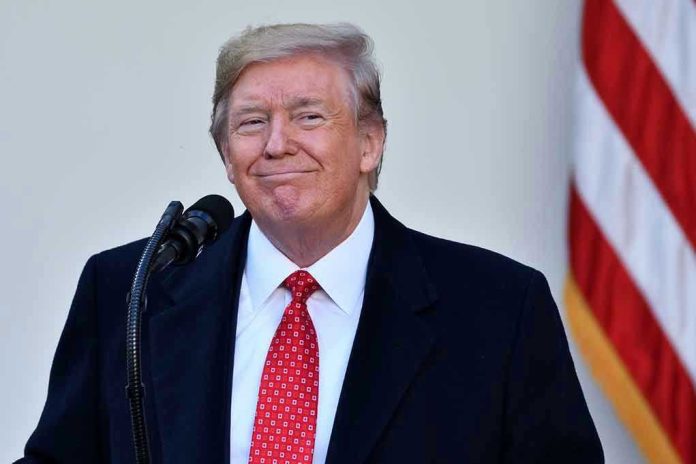
When world leaders crack a joke and then lock in a deal that could reshape global supply chains, suddenly diplomacy sounds a lot more interesting—and a lot more personal.
Story Snapshot
- Trump and Albanese sealed a pivotal agreement on critical minerals and rare earths, boosting economic and security ties.
- A public display of camaraderie—including jokes about golf—set the stage for high-stakes policy decisions.
- The U.S.-Australia alliance now stands as a counterweight to China’s dominance in the Indo-Pacific region.
- Expedited defense cooperation promises rapid delivery of nuclear-powered submarines to Australia.
Personal Diplomacy Meets Strategic Stakes in the White House
The White House played host to a summit where U.S. President Donald Trump and Australian Prime Minister Anthony Albanese did more than trade policy points. They swapped golf jokes and travel banter, grabbing headlines and lightening the mood before announcing a sweeping minerals deal. For seasoned observers, the humor was more than a footnote—it was a signal of personal trust, the kind that makes hard-won agreements possible when the cameras are off. The rapport between Trump and Albanese transformed a routine diplomatic encounter into a showcase of alliance-building, influencing not just the tone but the tangible outcomes of the day.
Trump Has Humorous Moment With Australian Leader, Walks Away With Great Deal https://t.co/TrF899evgr
— overhead 440 (@overhead4402) October 21, 2025
With both leaders publicly inviting each other to their home turfs—Trump even musing about a Down Under golf round—the press core lapped up the banter. Yet, beneath the levity, a serious undercurrent ran through every handshake: the growing urgency to secure rare earth minerals and critical resources as tensions with China over Indo-Pacific dominance mount. This wasn’t just about friendship or photo ops. The White House summit came at a moment when global supply chains are being redrawn and alliances are tested by rapid technological and military escalation in the region.
Supply Chains, Submarines, and Geopolitical Chess
At the heart of the day’s agenda was a landmark U.S.-Australia agreement on critical minerals and rare earths—resources that power everything from smartphones to missile guidance systems. Australia’s vast reserves and the United States’ hunger for secure supply lines created the perfect conditions for a deal. The new pact promises to accelerate American investment in Australian mining and processing, directly challenging China’s grip on this strategically vital sector. By pledging to move quickly on nuclear-powered submarines under the AUKUS partnership, both nations signaled that their cooperation isn’t just economic; it’s a linchpin of regional security and deterrence.
The urgency for these agreements stems not just from economic interest but from a shared security calculus. As China ramps up its influence in the Pacific, both Washington and Canberra see the alliance as an insurance policy. The expedited submarine delivery and minerals pact are more than paperwork—they represent a doubling down on collective defense and technological edge.
Winners, Ripple Effects, and the Shadow of China
The immediate winners are clear: mining companies, tech manufacturers, and defense contractors on both sides of the Pacific. American firms get access to a stable supply of rare earths, reducing exposure to Chinese market manipulations. Australian industries receive an injection of U.S. capital and technology, creating jobs and fueling economic growth. The defense sector, too, stands to benefit as joint capabilities expand under the AUKUS framework.
For policymakers, the deal is a rare bipartisan win, reinforcing the idea that alliances—when built on both substance and personal trust—can still move the needle in a fractured world. For critics, however, the deepening U.S.-Australia military ties risk inflaming tensions in an already volatile region. Some analysts warn that while the deal may strengthen deterrence, it also raises the stakes of any miscalculation in the Indo-Pacific chessboard.
The Power of a Handshake—and a Good Joke
Diplomatic history is full of summits where leaders traded barbs or platitudes, but few where lighthearted moments set the tone for enduring policy shifts. The Trump-Albanese meeting will be remembered not just for what was agreed, but for how it was agreed: through a blend of personal rapport and clear-eyed negotiation. The leaders’ willingness to be seen laughing together in public sent a message—alliances only work when leaders trust each other enough to let their guard down, even briefly.
The story, of course, is still unfolding. Implementation of the minerals agreement and the submarine delivery will test the resilience of this renewed alliance. But one thing is certain: when humor opens the door to real deals, the world pays attention—and so do America’s rivals. For readers who think diplomacy is all dull speeches and stiff handshakes, this summit delivered a reminder that sometimes, progress starts with a punchline and ends with a handshake that matters.



